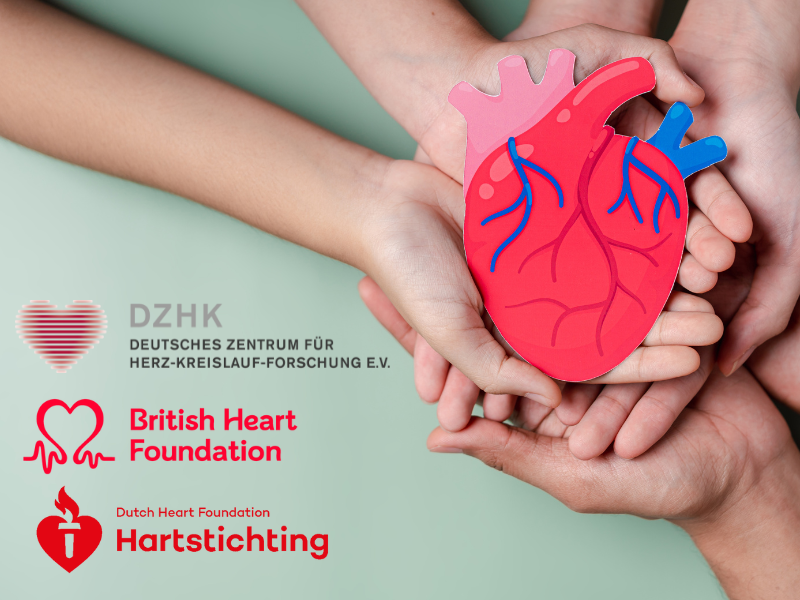This is the fourth time the European funders are working together and joining forces: In four projects, teams with scientists from the different countries are researching heart failure, atherosclerosis, heart failure in pulmonary hypertension and analysing thousands of proteins to predict the probability of a heart attack or stroke. The current funding round was specifically aimed at mid-career scientists.
Professor Stefanie Dimmeler, spokesperson of the DZHK Board of Directors says:
“Still, most people in Germany and worldwide die of cardiovascular diseases. One country alone cannot solve the problems of cardiovascular medicine. If we combine our resources and work together internationally, we will reach our common goal faster - to better treat or even cure cardiovascular diseases.“
Researchers from the DZHK are involved in all projects. These four projects were selected:
PLAK-TALK – Understanding cell-to-cell communication to prevent heart attack- and stroke-causing arterial blockages
Specific cells in the immune system which cause inflammation are known to increase the risk of “fatty plaques” developing in arteries that are likely to rupture and cause a clot that blocks blood flow to the heart or brain. The PLAK-TALK team will study how specific immune cells called T cells communicate with other cells in protective ‘caps’ covering fatty plaques, to regulate the caps’ stability. These new insights could help design new treatments to ultimately prevent plaques from rupturing and breaking off, and stop devastating heart attacks and strokes from striking.
Professor Lars Maegdefessel, Technical University Munich; Dr Jason Tarkin, University of Cambridge; Professor Marit Westerterp, University Medical Center Groningen
PROMETHEUS – Revealing genetic clues for why some hearts are unable to adapt to dangerously high blood pressure in the lungs
Failure of the right side of the heart to function as it should is the leading cause of death in people with pulmonary arterial hypertension (PAH), a condition where blood pressure in lung arteries is dangerously high. The right main chamber of the heart, which pumps blood through lung arteries, needs to adapt to pumping against the high pressure that it encounters in people with PAH. However, for unknown reasons, the hearts of some patients with PAH are unable to adapt and this can lead to right heart failure. This suggests that that genetic variants may determine the adaptation capacity of the right heart. In addition, cardiac alterations in PAH are not limited to the right side of the heart. Left ventricle – which supplies systemic blood circulation – can be significantly impaired in PAH, making this condition significantly demanding for the heart and the body in general. The PROMETHEUS team will investigate specific genetic differences that might determine the right heart’s ability to adapt to pressure overload, to help find new ways of preventing heart failure in PAH.
Professor Soni Pullamsetti, Max Planck Institute for Heart and Lung Research; Dr Gabriele Schiattarella, Charité - Universitätsmedizin Berlin; Dr Frances S. de Man, Amsterdam University Medical Center Dr Andrew Swift, University of Sheffield.
Prot4CVD – Protein deep-dive to improve cardiovascular disease risk prediction and management
Cardiovascular diseases, particularly heart attacks and strokes, are the leading cause of death worldwide. The Prot4CVD team plan to analyse measurements of thousands of proteins in blood from 200,000 people, in tandem with their genetic and clinical data, using new computational methods to identify proteins that can help predict the likelihood of having a heart attack or stroke. They also hope to pinpoint proteins that cause people to have heart attacks or strokes, providing ideas for new treatments. These analyses have not been performed at a comparable scale previously and the team expect their findings to help improve the prevention and management of devastating cardiovascular diseases.
Professor Claudia Langenberg, Berlin Institute of Health at Charité (BIH); Professor Adam Butterworth, University of Cambridge.
MegaCardiocyte - Mapping a blood-bone marrow-heart axis to identify new drug targets for heart failure
Heart failure is a debilitating and progressive disease that has no cure and is often lethal. For a particular type of heart failure which arises from an impaired ability of the heart’s chambers to relax between beats, abnormal function of small blood vessels is likely to be an important triggering factor. The MegaCardiocyte consortium will explore the link between small blood vessel function and that type of heart failure. They suspect it might be attributed to malfunctioning blood platelets – normally responsible for clotting – that, together with an overactivation of immune cells in the blood, compromise the ability of small blood vessels in the heart to work normally. The work may lead to the development of platelet-targeted treatments in the prevention and management of heart failure.
Dr Tobias Petzold, Ludwig Maximilian University of Munich; Professor Steffen Massberg, Hospital of the Ludwig-Maximilians-University Munich; Dr Mairi Brittan, University of Edinburgh; Dr Judith Cosemans, CARIM University Maastricht.
Contact: Christine Vollgraf, Press and Public Relations, German Centre for Cardiovascular Research (DZHK), phone +49 30 3465 529 02, presse(at)dzhk.de


